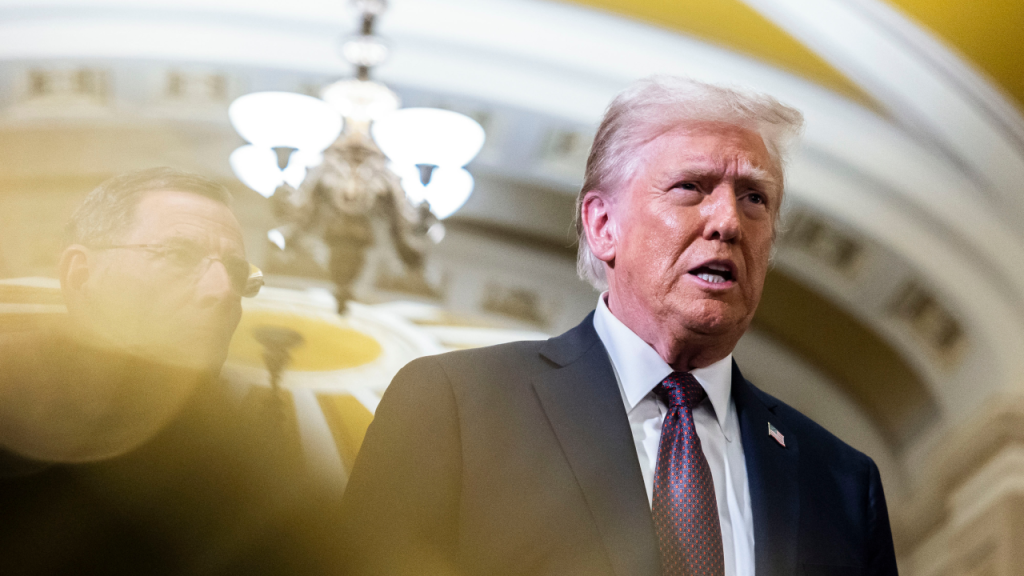With President Donald Trump returning to the White House for a second term, Americans can expect to see major tax-law changes in the years ahead.
During his first stint in office, Trump massively overhauled the tax code by passing the Tax Cuts and Jobs Act (TCJA) of 2017. Now, many of those tax provisions are set to expire at the end of 2025, leaving an opportunity for the president to extend, and potentially expand, his tax policy agenda.
Under the TCJA, key changes were made to individual tax laws, including the near-doubling of the standard deduction and increasing the child tax credit to $2,000, from $1,000.
Plus, the top tax rate for high-income earners was lowered to 37 percent, from 39.6 percent, and a new 20 percent deduction was created for certain types of business income.
And, along with the possibility of extending the TCJA’s provisions, it’s likely that other tax laws will change as well. On the campaign trail, Trump promised a variety of tax breaks, including removing the TCJA’s $10,000 cap on the deduction for state and local taxes, and eliminating taxes on tip income, overtime pay and retirees’ Social Security benefits.
Here are some ways your taxes may change in 2025 and beyond.
Tax benefits for small businesses
The TCJA lowered the corporate tax rate for businesses to a flat 21 percent, from a graduated system that had a top rate of 35 percent. That change was made permanent and isn’t part of the TCJA’s expiring provisions (though just about any tax law is potentially subject to lawmakers’ modifications).
But the TCJA also offered a major tax break to pass-through businesses, such as partnerships, S-corporations and sole proprietors: If those businesses meet income limits and eligibility requirements, they can deduct 20 percent of their qualified business income, or QBI — a major tax benefit for businesses that qualify. That provision is slated to expire at the end of 2025.
While there is bipartisan support to extend the QBI deduction, also known as the Section 199A deduction, it’s unclear at this point what will happen.
Plus, pass-through businesses — where business owners report income on their personal tax return and pay individual income tax rates on that income — also benefit from the TCJA’s lower marginal tax rates.
Jan Lewis, a certified public accountant and partner with BMSS Advisors and CPAs in Ridgeland, Miss., says small-business owners would appreciate it if Congress extended the TCJA provisions such as the qualified business income deduction. Lewis says the certainty of having the laws in place for several years rather than constant change would be welcome news.
Some business owners “may feel better about investing in their businesses and local economies with an extension of TCJA,” Lewis says.
State and local taxes (SALT) cap
To pay for the cost of TCJA, lawmakers eliminated personal exemptions, which were a way for taxpayers to reduce their taxable income, and capped the amount taxpayers could claim for the state and local tax (SALT) deduction at $10,000. The SALT deduction lets taxpayers write off their property taxes, plus their state and local income or sales taxes.
On the campaign trail, Trump suggested he wanted to remove the SALT limit. Meanwhile, other ideas currently being floated by lawmakers include raising the cap to $20,000, from $10,000, or doubling the amount for couples who are married filing jointly. The current $10,000 cap applies to all filing statuses, including single filers and those married filing jointly (the exception is those who are married but file separately, for whom the cap is $5,000).
Of course, removing the cap, or even increasing it, would raise thorny questions about how to fund the extension of other elements of the TCJA. “Repealing the SALT limit would be taking away some of the revenue to pay for other TCJA reforms,” Lewis says.
Tax breaks on other income
Trump also said on the campaign trail that he wants to eliminate taxes on certain types of income.
- Tax on Social Security benefits: “Seniors should not pay tax on Social Security,” Trump said on his social media site Truth Social in July. Some retirees owe income tax on Social Security benefits if they receive income from other sources that pushes them over the Social Security administration’s income thresholds. Those with low to modest income typically don’t pay taxes on Social Security benefits.
- Tax on overtime pay and tip income: In September, Trump proposed eliminating taxes on both overtime pay and tip income. Although Trump has not provided additional details of how the plan would work, the Tax Foundation, a nonprofit tax policy organization, said that eliminating taxes on overtime pay could “distort” the labor force. That is, workers might take on more overtime jobs, because those would be more attractive than salaried positions that are exempt from overtime rules.
-
Tax on U.S. expatriates’ income: In October, Trump said he supports reducing taxes on U.S. citizens who live abroad. Currently, expatriates are subject to tax on their income despite living outside the U.S. and are required to follow the same rules as taxpayers who live in the U.S.As such, expats must report all taxable income and pay taxes in accordance with the Internal Revenue Code. That said, a good portion of foreign income — in 2024, $126,500 for qualified single filers and $253,000 for qualified married-filing-jointly filers — is excluded from U.S. tax. There are also tax benefits to offset expats’ housing costs.
However, even expatriates who qualify for the foreign earned income exclusion and other tax benefits still must file a U.S. tax return.
Trump’s tariffs and the new External Revenue Service
In January, Trump announced on Truth Social that he would create an External Revenue Service to collect tariffs, duties and revenues from foreign sources. He said he plans to launch the new entity on Jan. 20, the day of his inauguration.
The proposed creation of the External Revenue Service aligns with his campaign promise to collect new tariffs, which are similar to taxes but imposed on foreign goods. Generally, U.S. companies that buy foreign goods pay import tariffs to the U.S. government. Trump has promised up to 20 percent tariffs, and at least 60 percent on all imports from China. Research has shown that consumers often end up footing the bill for higher tariffs.
“The implementation of tariffs had an impact on small businesses over the years, as many U.S. businesses rely on goods imported from other countries, including China, and countries who do business with China,” says Brandi M. Samuel, a certified public accountant and international tax principal at Windham Brannon LLC, in Atlanta.
President Trump has proposed “taxing imports at a rate of up to 60 percent,” Samuel says. “In addition to the impact on small businesses, customers who purchase these goods are likely to also experience financial strain if these tariffs are enacted.”
Samuel says that business owners should start planning and negotiating vendor prices to stay strategically competitive.
Read the full article here









